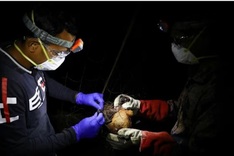These days, Kim Hong Village in the central province of Nghe An is largely deserted, the remaining dwellers being mostly elderly, women or small children.
 |
| A resident works in Kim Hong Village in Nghe An Province, one of the villages in Tuong Chuong District where those displaced by the Ban Ve hydropower plant were to be settled. — VNA/VNS Photo Bich Hue. |
Empty houses and abandoned gardens are not what you would expect from a village designated as a resettlement area. Kim Hong was one of the villages in Tuong Chuong District where those displaced by the Ban Ve hydropower plant were meant to be resettled.
The hydropower project was approved in 2003 and resettlement started the year after, but it is still not complete.
On top of that, of those households that were successfully resettled, 150 have returned to their old homes because of several lapses and shortcomings in land distribution and in the establishment of a new community.
This has subsequently interrupted education for many children and watered down the village\'s cultural identity.
Demographic and social management is getting troublesome in Kim Hong village since its population dropped from 103 to a worrying 16 households.
People have moved primarily because of a failure to help people adapt to their new working and living environments.
It has been three years since the people were relocated, but the lack of productivity is still noticeable.
Village chief Chuong Xuan Tan pointed at the piece of land he was distributed and bitterly said: "What kind of plant would grow from this really?"
Dry soil and limited agricultural land have halted production and rendered living standards less stable compared to what people had expected from the resettlement plan.
Other basic infrastructure such as clean water and kindergartens are also lacking, another reason why people refuse to stay in the village.
No longer under the care of their old local authorities, returning people often end up stranded in the forest or on the lakeside. However, they can at least live off their fishing, which is still better than going hungry. But once the adults started abandoning their new village, the children started to suffer.
Those who followed their parents dropped out of school while those who stayed inevitably neglected their studies.
Twelve-year-old Lo Thi Thom now lives with her siblings as their parents have gone back to their old home in Tuong Duong.
When asked about her preparations for the new academic year, Thom timidly said: "I have old clothes and books…"
Schools have opened but the young girl has to stay home to take care of the smaller kids so that her siblings can go to work instead of their parents.
Tuong Duong District leaders said they had attempted to persuade returning households to go back to their new village but the efforts had not paid off.
Tan said: "People will not go back to the resettlement areas unless provided with decent living conditions.
"Some of them would rather keep their kids off school for a year or two than return to poverty!"
That is, however, not the only obstacle faced by Kim Hong Village.
Material life aside, many also fear a gradual erosion of cultural identity and an emerging apathy to village customs and traditional values.
Of Thai ethnic minority decent, people used to celebrate their harvest at the end of each season with a sacred ceremony.
Since they moved to Kim Hong, the custom seems to have been abandoned.
According to Vi Van Tinh, a villager, the ceremony plays a pivotal role in Thai culture in which spiritual beliefs are deeply entrenched.
"Through celebrations we express our gratitude to the gods and to our deceased ancestors, and pray for another prosperous season of rice, taro, ginger and winter melon," he said.
It was also a way to teach youngsters the value of food and hard work, Tinh added.
"The ceremony is therefore essential to the preservation of our culture, but here we do not have any harvest to celebrate…", he said in a regretful voice.
Meanwhile, having moved to a Kinh (Vietnamese majority) neighbourhood, they have gradually taken up Kinh practices, and to some extent, abandoned their original lifestyle.
As many women have given up their traditional dress, the sericulture which they are known for is now facing a rather bleak future.
Even fundamental customs such as weddings and funerals are also influenced by the Kinh.
For example, the bride used to go the husband\'s house at night, but now she goes during the day.
Traditional music and games are in a no better situation. As noted by village member Loc Thi Huong, they were extremely rare these days.
She pointed out that it was the lack of communal space that mainly accounted for the regrettable situation.
Tan shared the opinion and added that blame should not be put entirely on people who were already caught up with the heavy burden of making a living.
On prospective solutions to preserve and promote Thai culture in resettlement areas, Tuong Duong District\'s vice chairman Vi Tan Hoi insisted that local authorities had shown support for the resettled community\'s cultural integration.
"However, if people themselves do not embrace their own culture, a gradual erosion of identity will be inevitable," he added.




















